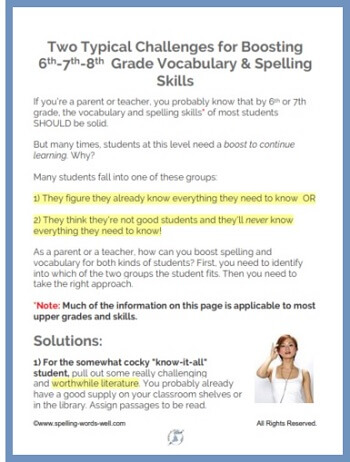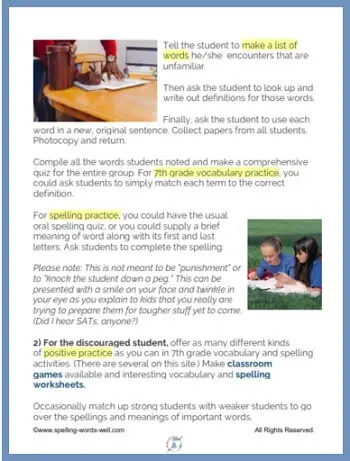7th Grade Vocabulary
and Spelling Boosters
If you're a parent or teacher, you probably know that by 7th grade vocabulary and spelling skills* of most students SHOULD be solid. There are many, many more vocabulary words to learn, and students should be learning them reasonably fast on their own, as they grow in knowledge in various subject areas.
For starters, check your students' expertise with the words on these lists:
Then see how many of these 7th grade vocabulary words your students already know. If they know half of these 36 words, they are in a good place. Encourage them to learn the rest on their own or with a partner.
acclamation
acquisition
advocate
aeronautics
bipartisan
boisterous
circumlocution
coagulate
commissariat
effusion
entomology
expenditure
familial
fjord
flippancy
gardenia
haphazard
kibosh
lacerate
lector
magnanimous
malleable
nefarious
nexus
noncommittal
obelisk
tabulate
taciturn
tantamount
unequivocal
wainwright
waiver
zephyr
But many times, students at this level need a boost to continue learning. Why?
Two Typical Challenges for Boosting
7th Grade Vocabulary & Spelling Skills
Many 7th grade students fall into one of these groups:
1) They figure they already know everything they need to know OR
2) They think they're not good students and they'll never know everything they need to know!
As a parent or a teacher, how can you boost spelling and vocabulary for both kinds of students? First, you need to identify into which of the two groups the student fits. Then you need to take the right approach.
Here's a peek at the first two pages of the printable version of these tips. The full text also appears below.
*Note: Much of the information on this page is applicable to most upper grades and skills.
Solutions:

1) For the somewhat cocky "know-it-all" student, pull
out some really challenging and worthwhile
literature. You probably already have a good supply on
your classroom shelves or in the library. Assign passages to be
read.

Tell the student to make a list of words he/she encounters that are unfamiliar. Then ask the student to look up and write out definitions for those words. Finally, ask the student to use each word in a new, original sentence. Collect papers from all students. Photocopy and return.
Compile all the words students noted and make a comprehensive quiz for the entire group. For 7th grade vocabulary practice, you could ask students to simply match each term to the correct definition.
For spelling practice, you could have the usual oral spelling quiz, or you could supply a brief meaning of each word along with its first and last letters. Ask students to complete the spelling of each word.
Please note: This is not meant to be "punishment" or to "knock the student down a peg." This can be presented with a smile on your face and twinkle in your eye as you explain to kids that you really are trying to prepare them for tougher stuff yet to come. (Did I hear SATs, anyone?)

2) For the discouraged student, offer as many different kinds of positive practice as you can in 7th grade vocabulary and spelling activities. (There are several on this site.) Make classroom games available and interesting vocabulary and spelling worksheets.
Expose them to the practical need to learn new vocabulary words. For example, if a student is interested in a specific hobby, sport or vocation, encourage him/her to research the tools, skills, training or credentials required to succeed in this area. As the student takes notes, he/she is sure to encounter new vocab!
Occasionally match up strong students with weaker students to go over the spellings and meanings of important words.
Conclusion:
Remember that "nothing succeeds like success." As your struggling students make progress -- and they will -- be sure to acknowledge their successes.
At this age, of course, gold stars
and smiley faces won't mean much. But a simple, "Good job, Kate," in
front of a few other students, or a quick note written in the margin of
a quiz will mean a lot.
The temptation at this age for teachers, parents and students, is to become complacent with low achievers in 7th grade vocabulary, spelling and even math.
You may have heard that the gap between the strongest and weakest students widens as kids move through the upper grades. That is usually true.
BUT it doesn't have to be that way for every student, and certainly not for YOURS.
Keep looking for interesting ways to challenge students who are performing all levels of difficulty. When you find something that works especially well, be sure to share it with me, and I'll pass it along on this website!
7th Grade Vocabulary Words
7th Grade Vocabulary Words - Here are 240 challenging words to stretch your upper grade students this year! Follow all the tips and extra activities listed to get the most out of this mega list of vocabulary words. You'll find a plethora of people and place words, along with many new verbs, adverbs and adjectives. Then dive in and help your students begin to use these words!
Find more Vocabulary Word Lists.
More Helpful Resources
Other helpful resources:
- Wacky Weather Worksheet
- 7th Grade Spelling Words
- 8th Grade Vocabulary and Spelling Practice
- More Challenging Worksheets for Spelling Practice
- 9th grade Vocabulary and Spelling Practice
- Difficult English Spelling Word Lists

Ann Richmond Fisher is a longtime published educational writer, a former classroom teacher and a former homeschool teacher. Ann's spelling bee resources, graded spelling word lists, spelling games, worksheets, and other language arts resources have become respected around the globe since she launched Spelling-Words-Well in 2010.
Ann is also the creator of www.word-game-world.com.
- Spelling Words Well ›
- 7th – 12th Grade Spelling ›
- Vocab Boosters





